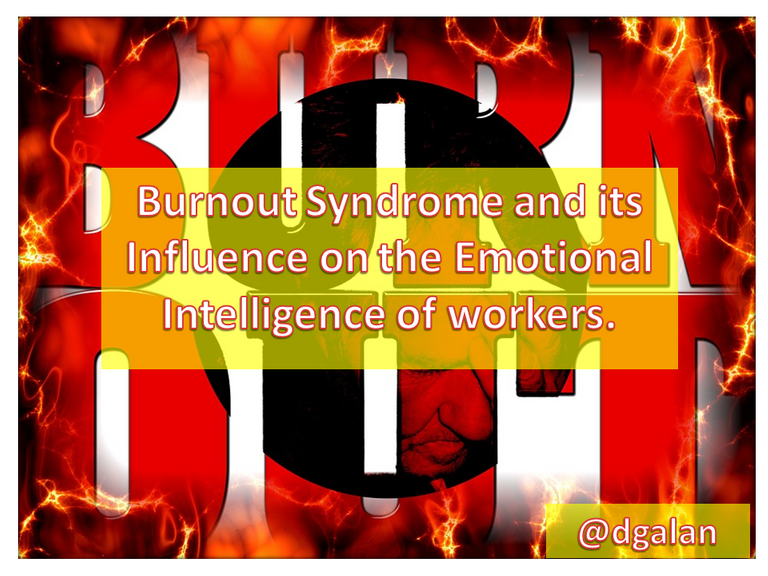Burnout Syndrome and its Influence on the Emotional Intelligence of workers.
Written by:Diomer Antonio Galán Rincón.
Bachelor's Degree.Public Accounting / MSc.Science of Higher Education.

Author: @dgalan,through Power Point 2010 tool, and using public domain image Pixabay
Nowadays, organizations establish as organizational success the performance of their workers, however, the execution of work activities are a fundamental factor in the growth of the individual, because, through them, needs are satisfied.
However, the human being, besides modifying the conditions of the world around him, is also affected himself, since his own work provides him with the opportunity to develop his qualities and skills, to relate to others and to feel valuable as a person.
Therefore, nowadays in the work life of individuals we observe how various transformations are caused that somehow alter the development of their functions, such as the retention of information, schedule pressures, management of new technological equipment, job discrimination among others, all these factors could become a problem for the health of the worker, this problem is known as Burnout Syndrome or professional burnout syndrome as it is also known.

Image taken from:Pixabay
In this way, according to Salazar (2014) states that "Burnout syndrome has become part of everyday life, being considered as a discomfort that affects professionals in terms of their ability to work, handling situations, difficulty in achieving organizational objectives, also affecting health and personal well-being. However, work environments can cause Burnout syndrome in some people more than in others, especially when there is an imbalance between demands and competencies".
Therefore, in the work environment it has been shown that this psychosocial disease called Burnout syndrome is a frequent disorder within the business world, being very vulnerable professionals in which the existence of intense and lasting human interactions can be observed.
Thus, it is very important that management can take into account the factors that affect the development of the activities of workers, as well as the quality of working life offered to their employees, in addition to considering the welfare aspects of occupational health when evaluating the effectiveness, efficiency and effectiveness of a given organization.

Image taken from:Pixabay
In fact, the negative interaction between the work environment, can derive diverse consequences of this syndrome, among which we can mention headaches, discomfort, lack of communication, isolation, rupture of family relationships, exhaustion, loss of interest, lack of enthusiasm for work and life in general, low self-esteem, emotional exhaustion, feelings of guilt for lack of professional success, emotional distancing, and isolation, all of which could become a conflict for the achievement of successful results.
Undoubtedly, emotional intelligence is related to the above, because it is assumed as a set of skills that determines the behavior of an individual, his actions, his attitudes, his style of coping with life and communicating, which helps to externalize in a fair way the emotions of the individual, being able to reduce absenteeism and staff turnover; also allows to increase self-esteem and attitudes, which will have a positive tendency to assimilate changes and succeed personally and at work.
I hope you like my article and I would appreciate all your comments.
Bibliographic References:
0
0
0.000
0 comments